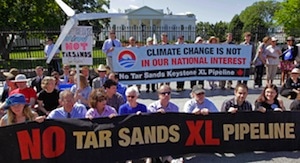As thousands of protestors gather at The White House today to voice opposition to the Keystone XL Pipeline plan, one of the major selling points from the pipeline proponents is revealed as flawed and perhaps completely bogus. According to The Washington Post, the prospect of job creation – the reason so many people in America support the pipeline – isn’t as rosy as TransCanada would have us believe. In fact, their numbers don’t add up at all.
TransCanada threw out a figure of 20,000 jobs (13,000 construction, 7,000 for suppliers) that would be created directly and indirectly through the pipeline construction process. This is the figure that politicians have used to sell the pipeline to their constituents. But as The Washington Post points out, TransCanada chief executive Russ Girling admits the 20,000 figure is far from honest:
Girling said Friday that the 13,000 figure was “one person, one year,” meaning that if the construction jobs lasted two years, the number of people employed in each of the two years would be 6,500. That brings the company’s number closer to the State Department’s; State says the project would create 5,000 to 6,000 construction jobs, a figure that was calculated by its contractor Cardno Entrix.
As for the 7,000 indirect supply chain jobs, the $1.9 billion already spent by TransCanada would reduce the number of jobs that would be created in the future.
A TransCanada statement Sept. 30 said the project would be “stimulating over 14,400 person years of employment” in Oklahoma alone. It cited a study by Ray Perryman, a Texas-based consultant to TransCanada, saying the pipeline would create “250,000 permanent jobs for U.S. workers.”
But Perryman was including a vast number of jobs far removed from the industry. Using that technique in a report on the impact of wind farms, Perryman counted jobs for dancers, choreographers and speech therapists.
So are the meager job numbers worth the environmental devastation? Again, the Post says “no”:
Meanwhile, the Cornell Global Labor Institute issued a study suggesting that any jobs stemming from the pipeline’s construction could be outweighed by environmental damage it caused, along with a possible rise in Midwest gasoline prices because a new pipeline would divert that region’s current oversupply of oil to the Gulf Coast.
Even if TransCanada’s original claim of creating 20,000 jobs were accurate, it wouldn’t be enough justification for approving the Keystone XL pipeline, which has drawn the Obama administration into an ethics scandal, enraged property owners along the proposed route, and garnered bipartisan opposition in places like Nebraska due to its multiple flaws.
Brad Johnson at ThinkProgress has even more debunking of the bogus jobs figures and who is repeating them despite evidence that they are false.
President Obama must decide whether this pipeline is in America’s best interest, and there are signs that he isn’t convinced. His White House is due to receive an earful today as Tar Sands Action returns to the front gates where 1,252 were arrested in August. If you want to follow the action on Twitter, look for hashtags #Surround, #tarscandal, #nokxl and follow @tarsandsaction.
Subscribe to our newsletter
Stay up to date with DeSmog news and alerts






